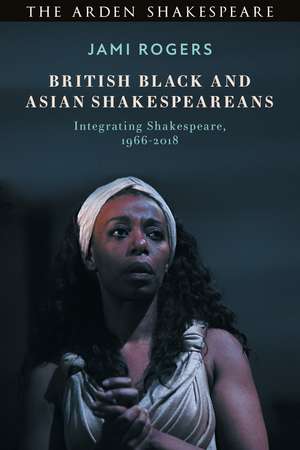British Black and Asian Shakespeareans: Integrating Shakespeare, 1966–2018
Autor Dr Jami Rogersen Limba Engleză Paperback – 20 apr 2022
| Toate formatele și edițiile | Preț | Express |
|---|---|---|
| Paperback (1) | 167.42 lei 3-5 săpt. | +64.90 lei 7-13 zile |
| Bloomsbury Publishing – 20 apr 2022 | 167.42 lei 3-5 săpt. | +64.90 lei 7-13 zile |
| Hardback (1) | 498.49 lei 6-8 săpt. | |
| Bloomsbury Publishing – 20 apr 2022 | 498.49 lei 6-8 săpt. |
Preț: 167.42 lei
Preț vechi: 216.29 lei
-23% Nou
Puncte Express: 251
Preț estimativ în valută:
32.04€ • 34.26$ • 26.71£
32.04€ • 34.26$ • 26.71£
Carte disponibilă
Livrare economică 27 martie-10 aprilie
Livrare express 13-19 martie pentru 74.89 lei
Preluare comenzi: 021 569.72.76
Specificații
ISBN-13: 9781350114883
ISBN-10: 135011488X
Pagini: 256
Ilustrații: 10 bw illus
Dimensiuni: 156 x 234 x 18 mm
Greutate: 0.42 kg
Editura: Bloomsbury Publishing
Colecția The Arden Shakespeare
Locul publicării:London, United Kingdom
ISBN-10: 135011488X
Pagini: 256
Ilustrații: 10 bw illus
Dimensiuni: 156 x 234 x 18 mm
Greutate: 0.42 kg
Editura: Bloomsbury Publishing
Colecția The Arden Shakespeare
Locul publicării:London, United Kingdom
Caracteristici
Includes interviews with key practitioners from multiple generations, including actors who broke the colour barrier such as Adrian Lester, Joseph Marcell, Ray Fearon, Paterson Joseph, Lolita Chakrabharti and Josette Simon
Notă biografică
Jami Rogers trained at LAMDA and has an MA and a PhD from the University of Birmingham, UK. Her career has spanned television and education, including eight years at PBS's Masterpiece Theatre in Boston, MA. She has taught classical acting at ArtsEd and Shakespeare at the University of Warwick, where she is an Honorary Fellow. She researches and writes about racial and gender inequality in Britain's live and recorded arts.
Cuprins
Note on interviewsAbbreviationsList of illustrationsList of tablesAcknowledgementsIntroduction: Forgotten Shakespeareans, 1825-1965Shakespearean pioneers, 1866-1947Shakespearean pioneers, 1950-1965Chapter One: "Difficult to justify this casting without sounding racist": breakthroughs and stereotypes, 1966-1972Royal Court - Macbeth - 1966Mermaid Theatre - The Tempest - 1970The Black Macbeth - Roundhouse Theatre, London - 1972"Difficult to justify this casting without sounding racist"Chapter Two: "Why weren't we auditioned?": the "black canon" and the battle for Othello"Why weren't we auditioned?"Reclaiming OthelloChapter Three: From "suitable roles" to leads, 1980-1987"Black roles" at the RSCMacbeth - Young Vic, 1984Leading roles, 1984Rosaline - RSC, 1984"Othello was an Arab" - RSC, 1985Emergence of a new "black canon"RSC 1986"They're nurturing you"Antony - Contact Theatre, 1987Isabella - RSC, 1987Julius Caesar - Bristol Old Vic, 1987Chapter Four: Owning Shakespeare - Temba, Talawa and Tara Arts, 1988-1994Romeo and Juliet - Temba, 1988Antony and Cleopatra - Talawa, 1991Troilus and Cressida - Tara Arts, 1993King Lear - Talawa, 1994Chapter Five: Cracking the glass ceiling, 1988-1996"You can't have a West Indian actor playing a Welsh poet ."Troilus. But West Indian opera singers can speak the verse?Young loversRosalind. Portia. The Shakespearean glass ceiling, 1988-1996. "Are we saying we're white people?". "That wouldn't have happened here". Birmingham Repertory Theatre, 1993-1996. Chapter Six: "Monarchs to Behold": 1997-2003. "I belong here". Othello, National Theatre, 1997. Women of colour: pushing against the glass ceiling, 1998-1999. RSC, 1999.Troilus and Cressida, National Theatre, 1999Identity and colour-blind castingAdrian Lester, Hamlet, 2000David Oyelowo, Henry VI, 2000Mu-Lan Romeo and Juliet, 2001Adrian Lester, Henry V, 2003The peak of progress?Chapter Seven: Progress Postponed, 2004-2011. "There's a few more parts we could play, you know". Tragic heroes and the Shakespearean glass ceiling, 2004-2011. Cross-cultural casting. "I think I need you to do an accent". Maids and prostitutes, stereotyping Lucetta and Bianca. A new dawn. Chapter Eight: Shakespeare from Multiculturalism to Brexit, 2012-2018. Julius Caesar and Much Ado About Nothing, RSC, 2012. Othello.Joseph Marcell - King Lear, Shakespeare's Globe, 2013. Shakespeare's histories, 2013-2015. Paapa Essiedu - Hamlet, RSC, 2016. "It was a lack of faith". Black Theatre Live's Hamlet and Talawa's King Lear, 2016. Alfred Enoch - Edgar, King Lear, Talawa, 2016. Women of colour in Shakespeare, 2016-2018. Josette Simon - Cleopatra, RSC, 2017"They never asked me"Sheila Atim - Emilia, Othello, Shakespeare's Globe, 2018Troilus and Cressida - RSC, 2018. Coda - 2019.and beyond?ReferencesIndex
Recenzii
A much needed history . Rogers's meticulous study is a clarion call for British Shakespearian performance - and the scholarship surrounding it - to do better.
A vital read for anyone interested in the gains made by, not just some of Britain's greatest actors of colour, but by some of Britain's greatest actors.
This is a book that I have eagerly awaited, both as a playgoer and as a cultural historian. Jami Rogers's engrossing account of Black and Asian Shakespeareans from Ira Aldridge to Josette Simon is a fascinating and timely contribution to Shakespeare studies, providing a much needed survey of the resistance that British actors of colour have long faced, as well as the inroads they have made in making Shakespeare truly representative.
Celebrating the contributions of actors of African-Caribbean and Asian heritage in the Shakespeare industry, this invaluable book contributes to decolonising the theatre and recuperating the experiences of practitioners of colour. - Adele Lee, Associate Professor, Department of Writing, Literature and Publishing, Emerson College
A vital read for anyone interested in the gains made by, not just some of Britain's greatest actors of colour, but by some of Britain's greatest actors.
This is a book that I have eagerly awaited, both as a playgoer and as a cultural historian. Jami Rogers's engrossing account of Black and Asian Shakespeareans from Ira Aldridge to Josette Simon is a fascinating and timely contribution to Shakespeare studies, providing a much needed survey of the resistance that British actors of colour have long faced, as well as the inroads they have made in making Shakespeare truly representative.
Celebrating the contributions of actors of African-Caribbean and Asian heritage in the Shakespeare industry, this invaluable book contributes to decolonising the theatre and recuperating the experiences of practitioners of colour. - Adele Lee, Associate Professor, Department of Writing, Literature and Publishing, Emerson College
